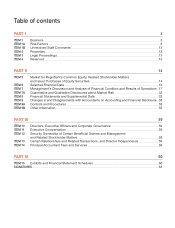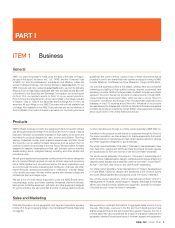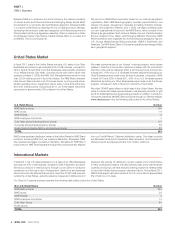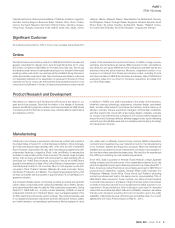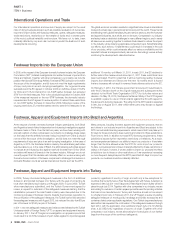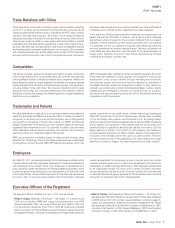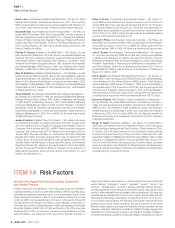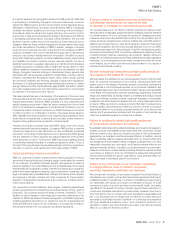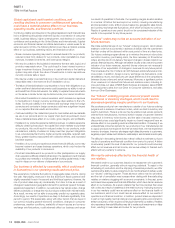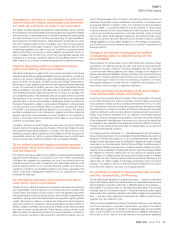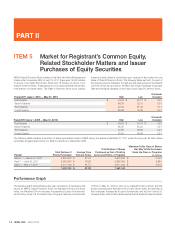Nike 2011 Annual Report Download - page 12
Download and view the complete annual report
Please find page 12 of the 2011 Nike annual report below. You can navigate through the pages in the report by either clicking on the pages listed below, or by using the keyword search tool below to find specific information within the annual report.12 NIKE,INC.-Form10-K
PARTI
ITEM1ARisk Factors
increases in demand, or need to replace an existing manufacturer, there
can be no assurance that additional supplies of fabrics or raw materials or
additional manufacturing capacity will be available when required on terms
that are acceptable to us, or at all, or that any supplier or manufacturer
would allocate suffi cient capacity to us in order to meet our requirements. In
addition, even if we are able to expand existing or fi nd new manufacturing
or sources of materials, we may encounter delays in production and added
costs as a result of the time it takes to train suppliers and manufacturers
in our methods, products, quality control standards, and labor, health and
safety standards. Any delays, interruption or increased costs in the supply
of materials or manufacture of our products could have an adverse effect on
our ability to meet retail customer and consumer demand for our products
and result in lower revenues and net income both in the short and long-term.
Because independent manufacturers manufacture a majority of our products
outside of our principal sales markets, our products must be transported by
third parties over large geographic distances. Delays in the shipment or delivery
of our products due to the availability of transportation, work stoppages, port
strikes, infrastructure congestion, or other factors, and costs and delays
associated with consolidating or transitioning between manufacturers, could
adversely impact our fi nancial performance. In addition, manufacturing delays
or unexpected demand for our products may require us to use faster, but more
expensive, transportation methods such as aircraft, which could adversely affect
our profi t margins. The cost of fuel is a signifi cant component in manufacturing
and transportation costs, so increases in the price of petroleum products can
adversely affect our profi t margins.
In addition, Sojitz America performs signifi cant import-export fi nancing services
for most of the NIKE Brand products sold outside of the UnitedStates, Europe,
Middle East, Africa, and Japan, excluding products produced and sold in the
same country. Any failure of Sojitz America to provide these services or any
failure of Sojitz America’s banks could disrupt our ability to acquire products
from our suppliers and to deliver products to our customers outside of the
UnitedStates, Europe, Middle East, Africa, and Japan. Such a disruption could
result in cancelled orders that would adversely affect sales and profi tability.
Natural disasters could negatively impact our operating
results and fi nancial condition.The March11,2011
Japanese earthquake and resulting tsunami negatively
affected our Japanese revenue and profi ts for the fourth
quarter ended May31,2011, and we expect those events
to continue to adversely affect us during fi scalyear 2012.
Natural disasters such as earthquakes, hurricanes, tsunamis or other adverse
weather and climate conditions, whether occurring in the U.S. or abroad, and
the consequences and effects thereof, including energy shortages and public
health issues, could disrupt our operations, or the operations of our vendors
and other suppliers, or result in economic instability that may negatively impact
our operating results and fi nancial condition.
On March11,2011, Japan experienced a signifi cant earthquake and resulting
tsunami.The implications from ongoing events and widespread damage to
the nation’s infrastructure, consumer confi dence and overall economy remain
unclear.Our revenues and profi ts for our Japan businesses were negatively
impacted during the fourth quarter of fi scalyear 2011, and although we
cannot fully assess the future fi nancial impact of these ongoing events, we
do expect our Japanese businesses to continue to be adversely impacted
throughout fi scal2012.
Our success depends on our global distribution facilities.
We distribute our products to customers directly from the factory and through
distribution centers located throughout the world. Our ability to meet customer
expectations, manage inventory, complete sales and achieve objectives for
operating effi ciencies depends on the proper operation of our distribution
facilities, the development or expansion of additional distribution capabilities, and
the timely performance of services by third parties (including those involved in
shipping product to and from our distribution facilities). Our distribution facilities
could be interrupted by information technology problems and disasters such
as earthquakes or fi res. Any signifi cant failure in our distribution facilities could
result in an adverse affect on our business. We maintain business interruption
insurance, but it may not adequately protect us from adverse effects that could
be caused by signifi cant disruptions in our distribution facilities.
We rely signifi cantly on information technology to operate
our business, including our supply chain and retail
operations, and any failure, inadequacy, interruption
or security failure of that technology could harm our
reputation or our ability to effectively operate our business.
We are heavily dependent on information technology systems across our
supply chain, including product design, production, forecasting, ordering,
manufacturing, transportation, sales, and distribution. Our ability to effectively
manage and maintain our inventory and to ship products to customers on
a timely basis depends signifi cantly on the reliability of these supply chain
systems. Over the last severalyears, as part of the ongoing initiative to upgrade
our worldwide supply chain, we have implemented new systems in all of our
geographical regions in which we operate. Over the next fewyears, we will
work to continue to enhance the systems and related processes in our global
operations. The failure of these systems to operate effectively, problems with
transitioning to upgraded or replacement systems, or a breach in security of
these systems could cause delays in product fulfi llment and reduced effi ciency
of our operations, could require signifi cant capital investments to remediate
the problem, and may have an adverse effect on our results of operations
and fi nancial condition.
Hackers and data thieves are increasingly sophisticated and operate large
scale and complex automated attacks. Any breach of our network may result
in the loss of valuable business data, our customers’ or employees’ personal
information or a disruption of our business, which could give rise to unwanted
media attention, damage our customer relationships and reputation and result
in lost sales, fi nes or lawsuits. In addition, we must comply with increasingly
complex regulatory standards enacted to protect this business and personal
data. An inability to maintain compliance with these regulatory standards
could subject us to legal risks.
Our fi nancial results may be adversely affected
ifsubstantial investments in businesses and operations fail
to produce expected returns.
From time to time, we may invest in business infrastructure, acquisitions of
new businesses, and expansion of existing businesses, such as our retail
operations, which require substantial cash investments and management
attention. We believe cost effective investments are essential to business growth
and profi tability. However, signifi cant investments are subject to typical risks
and uncertainties inherent in acquiring or expanding a business. Thefailure of
any signifi cant investment to provide the returns or profi tability we expect could
have a material adverse effect on our fi nancial results and divert management
attention from more profi table business operations.
We depend on key personnel, the loss of whom would
harm our business.
Our future success will depend in part on the continued service of key executive
offi cers and personnel. The loss of the services of any key individual could
harm us. Our future success also depends on our ability to identify, attract
and retain additional qualifi ed personnel. Competition for employees in our
industry is intense and we may not be successful in attracting and retaining
such personnel.
The sale of a large number of shares held by our Chairman
could depress the market price of our common stock.
Philip H. Knight, Co-founder and Chairman of our Board of Directors, benefi cially
owns over 74.6% of our ClassA Common Stock. If all of his ClassA Common
Stock were converted into ClassB Common Stock, Mr.Knight would own
over 17.8% of our ClassB Common Stock. These shares are available for
resale, subject to the requirements of the U.S. securities laws. The sale or
prospect of the sale of a substantial number of these shares could have an
adverse effect on the market price of our common stock.


